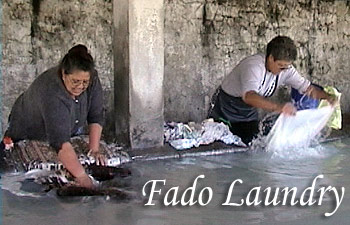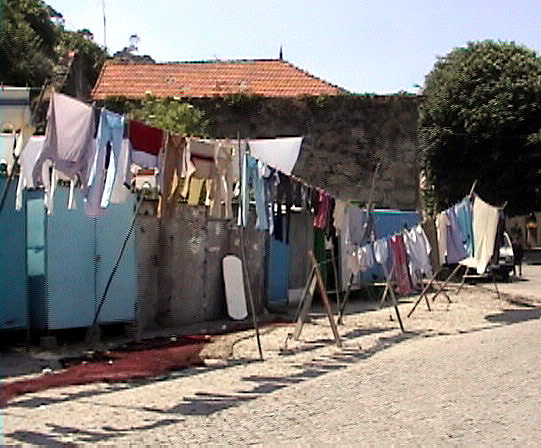 |
 |
 |
|
|||

Fado Laundry By Rolando Arrieta 9/13/2002 Amid its charming medieval coastal setting, Porto lacks one amenity for travelers, a Laundromat. "A Laundromat? There's no such a thing in this country," a tourism operator told me on the phone. For 3 months, I stayed in Porto, the "2001 European Capital of Culture." And, in my weekly quest to find a place to do my laundry, I came upon a uniquely Portuguese cultural jewel: "Os Tanques," in Afurada, a small fishing village just across the river. Sound: Portuguese women talking
Ana: "Gosto muito lavar afora. Nos temos maquina, mais gostamos mais lavar a mao. No se hacho que e habito da terra que nos estamos habituados a lavar y que todas gente tives saude, lavamamos mas no rio que na maquina. Somos uma clase pescatoria. Gostamos muito de lavar aqui nos tanque." "Os tanques," or the tanks, is an open-air public laundry made of individual cement stalls, with chiseled grooves for scrubbing. A hose pours an endless supply of clean running water. The stalls are old, gray, dark and corroded by the salty sea breeze, but it beats doing the laundry chores at home. Ana: "Nos estamos aca fora, nos fallamos, nos cantamos, nos reimos, vemos quem pasa, quem noa pasa. Estamos habituadas a lavar na agua correr. Gostamos muito de lavar aqui na rua." Fado is the folkloric music of Portugal. The lyrics often reveal a life of hardship, lost love and torment. Like the Blues in the U.S., singing Fado uplifts the soul. Sound: women singing and laughing
Sound: women singing The "tanques" in Afurada are free, first-come-first-serve. I went several times, but ended up doing more watching than washing. That's because I learned something else about doing laundry in this town. According to another clothes scrubbing regular, washing at the tanks is a job for women only. Scrubbing Regular: "E asi, si uma mulher a lavar, aqui ningem fala, ningem dice nada. Agora si vem um homen aqui a lavar, as persoas vam estar a criticar por ser um homen y estar aqui a lavar. E por eso. Mais, homens qui vem aqui a lavar nao se ve." But, hey, don't let that intimidate you, if you're guy. Pay a visit to the "tanques" to wash clothes, or simply to hear Fados. No matter what, you'll always receive a warm Portuguese welcome from the hard-working ladies of Afurada. Hand them a microphone and they'll gladly take a brake to sing a hymn of their own. In Afurada, Portugal, I'm Rolando Arrieta for The Savvy Traveler. Afurada is a short boat ride across the river from Porto. Daily, unscheduled ferries are available. But you can easily hitch a ride from the many fishing boats going back and forth. You may also take bus lines 91 and 83.
|
|
Search
Savvy Traveler
|
|


